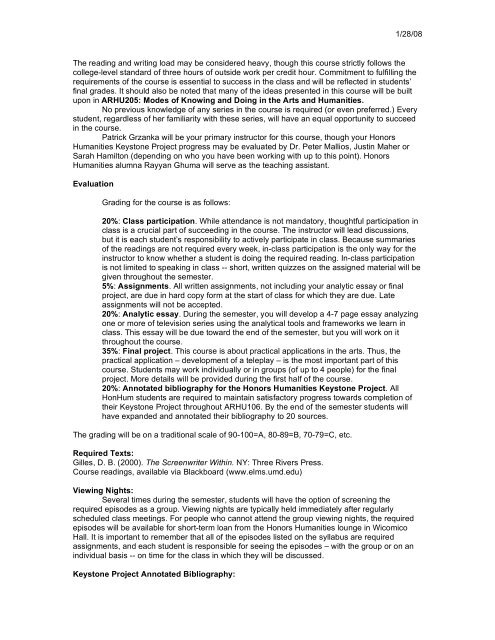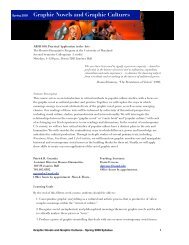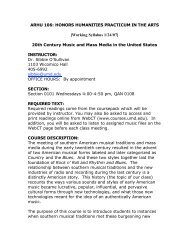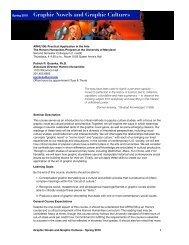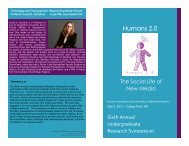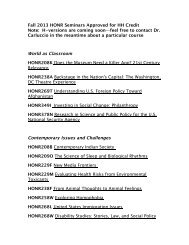Course Syllabus - Writing/Social Issues in Pop Culture (PDF) (2008)
Course Syllabus - Writing/Social Issues in Pop Culture (PDF) (2008)
Course Syllabus - Writing/Social Issues in Pop Culture (PDF) (2008)
Create successful ePaper yourself
Turn your PDF publications into a flip-book with our unique Google optimized e-Paper software.
1/28/08<br />
The read<strong>in</strong>g and writ<strong>in</strong>g load may be considered heavy, though this course strictly follows the<br />
college-level standard of three hours of outside work per credit hour. Commitment to fulfill<strong>in</strong>g the<br />
requirements of the course is essential to success <strong>in</strong> the class and will be reflected <strong>in</strong> students’<br />
f<strong>in</strong>al grades. It should also be noted that many of the ideas presented <strong>in</strong> this course will be built<br />
upon <strong>in</strong> ARHU205: Modes of Know<strong>in</strong>g and Do<strong>in</strong>g <strong>in</strong> the Arts and Humanities.<br />
No previous knowledge of any series <strong>in</strong> the course is required (or even preferred.) Every<br />
student, regardless of her familiarity with these series, will have an equal opportunity to succeed<br />
<strong>in</strong> the course.<br />
Patrick Grzanka will be your primary <strong>in</strong>structor for this course, though your Honors<br />
Humanities Keystone Project progress may be evaluated by Dr. Peter Mallios, Just<strong>in</strong> Maher or<br />
Sarah Hamilton (depend<strong>in</strong>g on who you have been work<strong>in</strong>g with up to this po<strong>in</strong>t). Honors<br />
Humanities alumna Rayyan Ghuma will serve as the teach<strong>in</strong>g assistant.<br />
Evaluation<br />
Grad<strong>in</strong>g for the course is as follows:<br />
20%: Class participation. While attendance is not mandatory, thoughtful participation <strong>in</strong><br />
class is a crucial part of succeed<strong>in</strong>g <strong>in</strong> the course. The <strong>in</strong>structor will lead discussions,<br />
but it is each student’s responsibility to actively participate <strong>in</strong> class. Because summaries<br />
of the read<strong>in</strong>gs are not required every week, <strong>in</strong>-class participation is the only way for the<br />
<strong>in</strong>structor to know whether a student is do<strong>in</strong>g the required read<strong>in</strong>g. In-class participation<br />
is not limited to speak<strong>in</strong>g <strong>in</strong> class -- short, written quizzes on the assigned material will be<br />
given throughout the semester.<br />
5%: Assignments. All written assignments, not <strong>in</strong>clud<strong>in</strong>g your analytic essay or f<strong>in</strong>al<br />
project, are due <strong>in</strong> hard copy form at the start of class for which they are due. Late<br />
assignments will not be accepted.<br />
20%: Analytic essay. Dur<strong>in</strong>g the semester, you will develop a 4-7 page essay analyz<strong>in</strong>g<br />
one or more of television series us<strong>in</strong>g the analytical tools and frameworks we learn <strong>in</strong><br />
class. This essay will be due toward the end of the semester, but you will work on it<br />
throughout the course.<br />
35%: F<strong>in</strong>al project. This course is about practical applications <strong>in</strong> the arts. Thus, the<br />
practical application – development of a teleplay – is the most important part of this<br />
course. Students may work <strong>in</strong>dividually or <strong>in</strong> groups (of up to 4 people) for the f<strong>in</strong>al<br />
project. More details will be provided dur<strong>in</strong>g the first half of the course.<br />
20%: Annotated bibliography for the Honors Humanities Keystone Project. All<br />
HonHum students are required to ma<strong>in</strong>ta<strong>in</strong> satisfactory progress towards completion of<br />
their Keystone Project throughout ARHU106. By the end of the semester students will<br />
have expanded and annotated their bibliography to 20 sources.<br />
The grad<strong>in</strong>g will be on a traditional scale of 90-100=A, 80-89=B, 70-79=C, etc.<br />
Required Texts:<br />
Gilles, D. B. (2000). The Screenwriter With<strong>in</strong>. NY: Three Rivers Press.<br />
<strong>Course</strong> read<strong>in</strong>gs, available via Blackboard (www.elms.umd.edu)<br />
View<strong>in</strong>g Nights:<br />
Several times dur<strong>in</strong>g the semester, students will have the option of screen<strong>in</strong>g the<br />
required episodes as a group. View<strong>in</strong>g nights are typically held immediately after regularly<br />
scheduled class meet<strong>in</strong>gs. For people who cannot attend the group view<strong>in</strong>g nights, the required<br />
episodes will be available for short-term loan from the Honors Humanities lounge <strong>in</strong> Wicomico<br />
Hall. It is important to remember that all of the episodes listed on the syllabus are required<br />
assignments, and each student is responsible for see<strong>in</strong>g the episodes – with the group or on an<br />
<strong>in</strong>dividual basis -- on time for the class <strong>in</strong> which they will be discussed.<br />
Keystone Project Annotated Bibliography:


